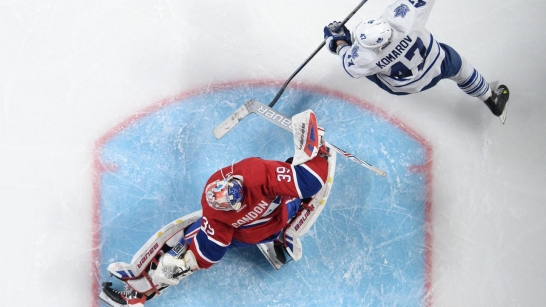ECHL goalie development finding success in NHL

Original Source: Kevin Woodley / NHL.com Correspondent
Posted on: Mar 12, 2016
Condon, Darling illustrate dividends from philosophy switch
VANCOUVER -- The Anaheim Ducks won a 16-team bidding war to sign Swiss goaltender Jonas Hiller on May 25, 2007. It was a watershed moment for the Ducks, who were on their way to a Stanley Cup championship at the time.
But it also was a bittersweet time for Francois Allaire, the goaltending coach for the Ducks at the time. He was excited to get Hiller, who had been a standout at Allaire's summer camps in Switzerland. But he also was concerned that Hiller's courting and arrival would start a trend toward older, more experienced European goalies.
If NHL teams turned toward European-groomed goalies, it would come at the expense of North American-based goalies in the minor leagues.
And for a while, Allaire's apprehension was warranted.
Following a path blazed by Hiller and Niklas Backstrom, who was 28 when he signed with the Minnesota Wild on June 1, 2006, older Europeans were recruited as free agents by NHL clubs, sometimes commanding one-way contracts in the NHL that gave them a leg up in competition with North American counterparts.
Jonas Gustavsson, Antti Niemi, Viktor Fasth and Antti Raanta were among the goalies to arrive in the recruiting wave that followed after Hiller's success.
While many of the European goalies benefitted from being able to develop longer in the pro leagues of their home country, the same was not happening for goaltenders that had been playing a while in the American Hockey League and ECHL, who started to be increasingly overlooked.
Fortunately it did not last long, much to the relief of Allaire and others.
During the past few seasons Scott Darling of the Chicago Blackhawks and Mike Condon of the Montreal Canadiens are among the goalies that used the ECHL as a path to the NHL.
And now many NHL teams are using the ECHL as a legitimate place to develop their own prospects.
"I would say there is a huge percentage now of NHL guys that played in the [ECHL] and they just go one step at a time," said Allaire, now the goaltending coach of the Colorado Avalanche. "Now the guy who plays in the [ECHL] is really more organized and the guy is under contract so he knows if there is one guy hurt in the No. 1, 2, 3, 4 spot, he is going up and he has a chance to be in the American league right away."
Allaire points to Roman Will, a member of the ECHL all-rookie team last season with Fort Wayne, as an example.
Will started this season with San Antonio, the Avalanche's AHL affiliate. But after injuries to the three goalies ahead of him on the depth chart, Semyon Varlamov, Calvin Pickard and Reto Berra, Will was called up to the NHL and made his debut Jan. 26 against the San Jose Sharks.
"His first minutes in the League and that's something, for kids to get a chance even to play one period in the NHL," Allaire said. "If you perform well and you develop properly you have a chance to step up."
The increased opportunities for ECHL goalies is, in part, the result of more goaltending instruction at that level during the past several years.
One of the attractions for goaltenders playing in Europe used to be the quantity and quality of the position-specific coaching they received, while it was common until recently for North American pro goalies to be left to their own devices in the minor leagues.
Now most organizations have a goaltending development coach who spends time with goalies in the AHL and ECHL.
Toronto Maple Leafs goaltender Garret Sparks played 36 games with Orlando in the ECHL last season, and he said that workload, along with access to Piero Greco, the goaltending coach for Toronto of the AHL, as key pieces of his development into a NHL goalie this season.
Vitek Vanecek, 20, a second-round pick (No. 39) by the Washington Capitals in the 2014 NHL Draft, came to play with South Carolina of the ECHL this season rather than stay in his native Czech Republic.
Vanecek believed it was more important to play this season, even in a lower league, than be a backup in the AHL. Washington wanted him somewhere in North America to begin his transition to the style of play on this side of the Atlantic.
"I think it's swinging back the other way," said Capitals associate goaltending coach Scott Murray. "More young guys are willing to go to a place where they can gain experience."
To keep reading CLICK HERE
